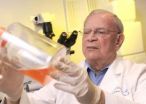(Press-News.org) The process of producing high-quality, fertile sperm requires many steps. A study in The Journal of Cell Biology shows how the transcription factor p73 promotes this process by regulating the adhesions between developing sperm and their support cells.
The p53 family of transcription factors has an ancient and well-conserved function in protecting reproductive cells. In mammals, for example, p63 promotes the death of eggs and sperm that have sustained DNA damage, and female mice lacking p73 are infertile due to defects in egg development. Male mice lacking p73 are also infertile, but the reason for this is unknown. Led by Ute Moll, a team of researchers from the University of Göttingen in Germany and Stony Brook University in New York studied the testes of p73-deficient rodents to find out why.
Sperm develop in the multilayered epithelia of seminiferous tubules in the testes. This process is enabled and organized by Sertoli cells, which span the seminiferous epithelium and tightly envelop maturing sperm cells at each stage of their development in "nursing pouches," guiding their differentiation and movement toward the surface, where they release mature, motile sperm.
The researchers found that developing sperm cells lacking p73 detached from the epithelium prematurely and died. The p73-deficient cells showed altered expression levels of many proteins that regulate adhesions between the developing sperm and their Sertoli nurse cells. Sertoli cells don't express p73, but they were also affected by the loss of adhesion in p73-deficient testes, losing their characteristic morphology as well as the inter-Sertoli cell adhesions that form the blood–testis barrier, which protects developing sperm from circulating immune cells and toxins.
The results demonstrate how p73 ensures male fertility in mice by regulating critical cell adhesions that enable sperm maturation. Moll now wants to investigate whether mutations in p73 also can cause human infertility.
INFORMATION:
Holembowski, L., et al. 2014. J. Cell Biol. doi:10.1083/jcb.201306066.
About The Journal of Cell Biology
The Journal of Cell Biology (JCB) is published by The Rockefeller University Press. All editorial decisions on manuscripts submitted are made by active scientists in conjunction with our in-house scientific editors. JCB content is posted to PubMed Central, where it is available to the public for free six months after publication. Authors retain copyright of their published works, and third parties may reuse the content for non-commercial purposes under a creative commons license. For more information, please visit http://www.jcb.org.
Research reported in the press release was supported by the National Cancer Institute and Deutsche Krebshilfe.
How developing sperm stick to the right path
2014-03-24
ELSE PRESS RELEASES FROM THIS DATE:
Radiation therapy and cancer vaccines: Timing is everything
2014-03-24
(PHILADELPHIA) – Radiation therapy fights cancer in more ways than one. Not only does it force cancer cells to self-destruct, but several studies demonstrate that it also activates the immune system to attack tumor cells. This activation can be used to boost current immunotherapies, such as anti-tumor vaccines, to produce better clinical results. What's less clear, however, is exactly how to combine the two therapies to get the best bang for the therapeutic buck.
To address this question, researchers at Thomas Jefferson University tested an experimental cancer vaccine ...
Unfolded proteins collapse when exposed to heat and crowded environments
2014-03-24
Proteins are important molecules in our body and they fulfil a broad range of functions. For instance as enzymes they help to release energy from food and as muscle proteins they assist with motion. As antibodies they are involved in immune defence and as hormone receptors in signal transduction in cells. Until only recently it was assumed that all proteins take on a clearly defined three-dimensional structure – i.e. they fold in order to be able to assume these functions. Surprisingly, it has been shown that many important proteins occur as unfolded coils. Researchers ...
Diabetes drug shows promise in reducing Alzheimer's disease in an experimental model
2014-03-24
(Boston) Researchers from Boston University School of Medicine (BUSM) have found that the diabetic drug, pramlintide, reduces amyloid-beta peptides, a major component of Alzheimer's disease (AD) in the brain and improves learning and memory in two experimental AD models. These findings, which appear online in Molecular Psychiatry, also found AD patients have a lower level of amylin in blood compared to those without this disease. These results may provide a new avenue for both treatment and diagnosis of AD.
AD is a degenerative brain disease associated with severe functional ...
Fair bosses pay a price
2014-03-24
EAST LANSING, Mich. — Bosses who are fair make their workers happier and their companies more productive, but in the end may be burning themselves out.
A new study led by Michigan State University's Russell E. Johnson found the act of carefully monitoring the fairness of workplace decisions wears down supervisors mentally and emotionally.
"Structured, rule-bound fairness, known as procedural justice, is a double-edged sword for managers," said Johnson, assistant professor of management. "While beneficial for their employees and the organization, it's an especially draining ...
The unconscious mind can detect a liar -- even when the conscious mind fails
2014-03-24
When it comes to detecting deceit, your automatic associations may be more accurate than conscious thought in pegging truth-tellers and liars, according to research published in Psychological Science, a journal of the Association for Psychological Science.
The findings suggest that conscious awareness may hinder our ability to detect whether someone is lying, perhaps because we tend to seek out behaviors that are supposedly stereotypical of liars, like averted eyes or fidgeting. But those behaviors may not be all that indicative of an untrustworthy person.
"Our research ...
Leaders are wired to be task-focused or team-builders, but can be both
2014-03-24
What sort of leader are you? Do you think leading is all about a laser-like focus on the task, watching the bottom line and making sure everyone is doing what they should? Or is it about listening to your team, being open to ideas and perspectives, and inspiring them to find their own niche?
Distinctions between a task-oriented leader and a social-emotional leader have filled the pages of academic literature for more than a half-century. But recent research strongly suggests the distinction has a foundation in our brains—which allows us to be either analytical or empathetic, ...
Want to survive the zombie apocalypse? This 'cologne' could be the key (video)
2014-03-24
WASHINGTON, March 24, 2014 — If you believe the doomsayers, a zombie apocalypse is coming, and you need to be prepared. On AMC's The Walking Dead, whose season finale airs Sunday, survivors are always worried about running out of bullets, arrows or even sharp sticks. But what if chemistry could help you get away from the flesh eaters? In the American Chemical Society's (ACS') latest Reactions video, we talk with chemist Raychelle Burks, Ph.D., who shares her recipe for a "death cologne" that might someday save you from the undead. The video is available at http://www.youtube.com/watch?v=SUEjmyisz7c.
INFORMATION:
Subscribe ...
Gene expression signature reveals new way to classify gum disease
2014-03-24
NEW YORK, NY (March 21, 2014) — Researchers at Columbia University Medical Center (CUMC) have devised a new system for classifying periodontal disease based on the genetic signature of affected tissue, rather than on clinical signs and symptoms. The new classification system, the first of its kind, may allow for earlier detection and more individualized treatment of severe periodontitis, before loss of teeth and supportive bone occurs. The findings were published recently in the online edition of the Journal of Dental Research.
Currently, periodontal disease is classified ...
Inherited mutated gene raises lung cancer risk for women, those who never smoked
2014-03-24
DALLAS – March 21, 2014 – People who have an inherited mutation of a certain gene have a high chance of getting lung cancer — higher, even, than heavy smokers with or without the inherited mutation, according to new findings by cancer researchers at UT Southwestern Medical Center. Although both genders have an equal risk of inheriting the mutation, those who develop lung cancer are mostly women and have never smoked, the researchers found.
People with the rare inherited T790M mutation of the epidermal growth factor receptor (EGFR) gene who have never smoked have a one-in-three ...
Researcher: Study on element could change ballgame on radioactive waste
2014-03-24
TALLAHASSEE, Fla. — Groundbreaking work by a team of chemists on a fringe element of the periodic table could change how the world stores radioactive waste and recycles fuel.
The element is called californium — Cf if you're looking at the Periodic Table of Elements — and it's what Florida State Professor Thomas Albrecht-Schmitt, the lead researcher on the project, calls "wicked stuff."
In carefully choreographed experiments, Albrecht-Schmitt and his colleagues found that californium had amazing abilities to bond and separate other materials. They also found it was extremely ...




